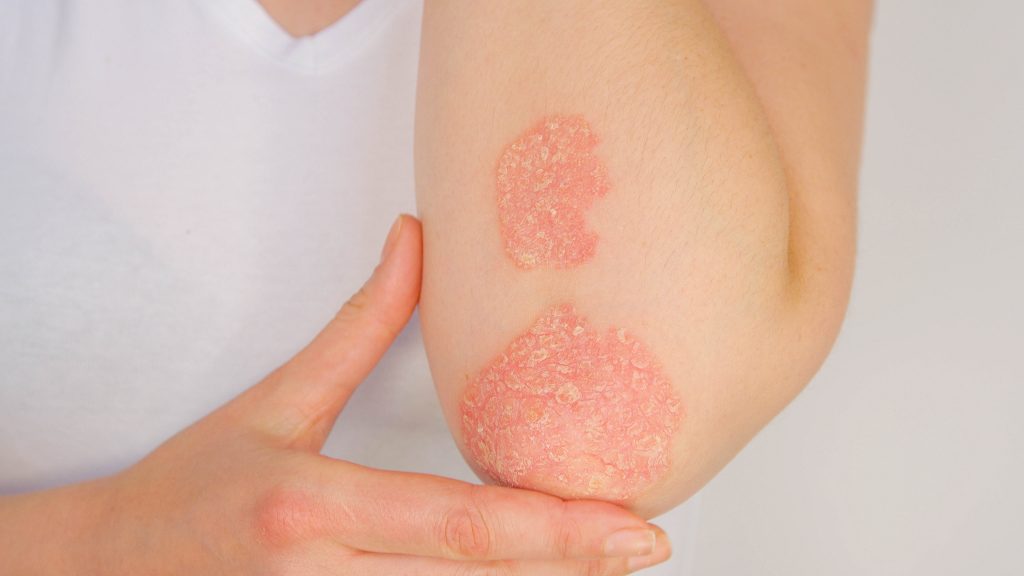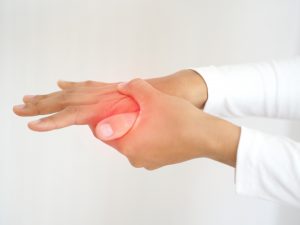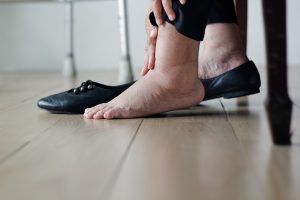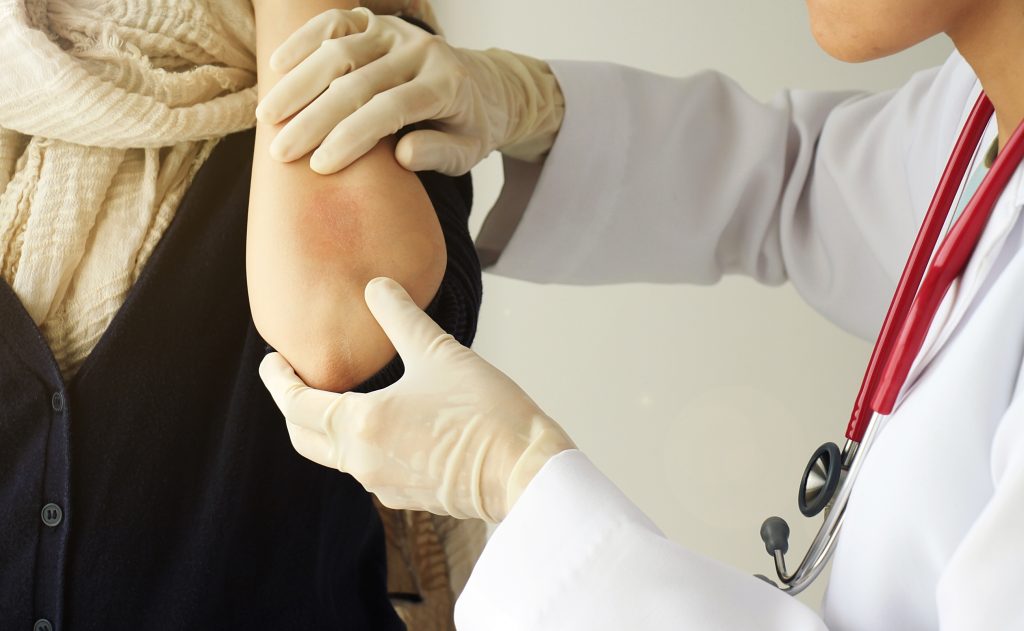May 12, 2022
7 Early Signs of Psoriatic Arthritis
Knowing how to spot early signs of psoriatic arthritis can help you determine whether it’s time to see your doctor for treatment.
Here’s more about this chronic condition, along with seven early psoriatic arthritis symptoms to watch out for.
What Is Psoriatic Arthritis?
Psoriatic arthritis is a type of inflammatory arthritis. It affects people who have a skin condition called psoriasis. According to a 2017 study published in Current Rheumatology Reports, this type of arthritis affects about 10% of people with psoriasis.
 Psoriasis causes red, scaly patches to grow on the skin. Some people with psoriasis may have joint pain before they are diagnosed with their skin conditions. Others with psoriasis do not develop arthritis until years later.
Psoriasis causes red, scaly patches to grow on the skin. Some people with psoriasis may have joint pain before they are diagnosed with their skin conditions. Others with psoriasis do not develop arthritis until years later.
This type of arthritis causes you to have stiff, swollen, and achy joints. It can affect joints in any part of your body and cause mild to severe pain. It affects each person differently.
There is no cure for psoriatic arthritis. However, it can be effectively treated and managed, so it causes you to experience less pain. Treatment can also help you avoid joint damage that can lead to disability.
7 Early Warning Signs of Psoriatic Arthritis
Many signs and symptoms could indicate you have psoriatic arthritis. Here are some of its most common early warning signs.
1. Joint Pain and Stiffness
 Joint pain is the top warning sign of psoriatic arthritis. The pain you feel in your joints is caused by inflammation. It can disappear and flare up again at any given time. The area may also feel stiff and tender when you touch it.
Joint pain is the top warning sign of psoriatic arthritis. The pain you feel in your joints is caused by inflammation. It can disappear and flare up again at any given time. The area may also feel stiff and tender when you touch it.
Joint pain caused by this type of arthritis may be most severe in the morning after you wake up. However, any joints can be affected. Fingers, toes, knees, ankles, and the lower back are the most common areas affected by psoriatic arthritis.
2. Swelling of the Joints
Inflammation can cause your joints to become swollen. They may also feel warm to the touch. Arthritis that affects the joints in your fingers and toes can cause them to look like sausages.
3. Lower Back Pain
Psoriatic arthritis that affects the spine can cause lower back pain and stiffness. This pain may also radiate to your hips and buttocks. Other symptoms you may experience include fatigue, muscle pain, and eye inflammation.
Back pain caused by arthritis may cause you to wake up in the middle of the night feeling sore. You may also feel sore for about 30 minutes in the morning after you wake up.
4. Changes to Nails
Psoriatic arthritis can cause changes in the appearance of your nails. Your nails may develop small holes and ridges, known as pits. Your nails may also become thicker, discolored, and deformed. In some people, the nails separate from the nail bed and end up falling off.
5. Eye Problems
This form of arthritis can cause swelling and irritation of the eyes. Your eyes may feel itchy and highly sensitive to light. You may also feel as though there is sand and dirt in your eyes. Your vision may become blurred, and you may have difficulty focusing on objects.
6. Fatigue
The inflammation that occurs with psoriatic arthritis can make you feel extremely weak and tired all the time. You may lack the motivation to move around and do usual activities like bathing, cooking, and driving.
7. Foot Pain
 Psoriatic arthritis can cause another painful condition called enthesitis. Enthesitis can cause pain in places where tendons attach to bones. It is most common in the feet and ankles.
Psoriatic arthritis can cause another painful condition called enthesitis. Enthesitis can cause pain in places where tendons attach to bones. It is most common in the feet and ankles.
If the joints in your feet or ankles are swollen or difficult to move, you may have this type of arthritis.
Other Early Symptoms of Psoriatic Arthritis
Psoriatic arthritis can cause other signs and symptoms. Elbow pain, reduced range of motion, and digestive problems are other common symptoms.
Pain in the elbow that is caused by arthritis may gradually become worse and radiate to your forearm and wrist. Your grip may also feel weak, and your pain may become more intense when you lift things, open jars, or squeeze objects.
A reduced range of motion could make it difficult for you to bend your knees or extend your arms without feeling pain. If the arthritis is in your fingers, you may have difficulty with typing, writing, and drawing.
Digestive problems caused by this type of arthritis may include bloating, gas, diarrhea, and constipation. Some people even develop inflammatory bowel disease (IBD), digestive tract inflammation.
Who Is at Risk for Psoriatic Arthritis?
Anyone can develop psoriatic arthritis, but certain factors can increase your risk. Common risk factors for this type of arthritis include:
 Psoriasis: Psoriasis is the number one risk factor for this type of arthritis. You are more likely to get it if your psoriasis is severe.
Psoriasis: Psoriasis is the number one risk factor for this type of arthritis. You are more likely to get it if your psoriasis is severe.- Family history of psoriatic arthritis: You may be at risk if anyone in your family has this condition.
- Age: This type of arthritis is most common among adults between the ages of 30 and 55.
- Nail disease: Having inflammation at the nail bed can increase your risk.
- Excess weight can increase inflammation related to this disease.
- Smoking
- Alcohol use
- Trauma
- Stress
- Infections that lead to hospitalization
Your doctor can review your medical history and talk to you about your lifestyle to determine your risk for psoriatic arthritis.
When To Seek Medical Attention
See your doctor as soon as possible if you have psoriasis and start having joint pain. You should also contact your doctor if you have any other first signs of psoriatic arthritis.
This condition can usually be diagnosed with a physical exam. Your doctor may examine your joints for signs of swelling and press on areas that may be tender. They may also order diagnostic tests to rule out other conditions, including other forms of arthritis.
Healthcare Associates of Texas is home to a large team of board-certified medical professionals who can work with you to treat your psoriasis. Click here to find your nearest location and request an appointment.
DISCLAIMER
The information featured in this site is general in nature. The site provides health information designed to complement your personal health management. It does not provide medical advice or health services and is not meant to replace professional advice or imply coverage of specific clinical services or products. The inclusion of links to other web sites does not imply any endorsement of the material on such websites.

